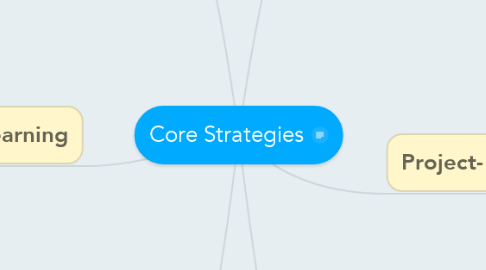Core Strategies
by Eunjung Yu

1. Comprehensive Assessment
1.1. "Effective assessment should measure the full range of student ability-- social, emotional, and academic achievement. Through carious measures, including portfolios, presentations, and tests, multiple learning styles are supported."
1.2. Instead of evaluating students' skills and knowledges based on just IQ tests or standardized tests, Edutopia encourage and reinforces different techniques and tools to evaluate students' levels and assessments
2. Integrated Studies
2.1. "To increase engagement and retention, academic subjects are presented in an interdisciplinary fashion that reflects modern knowledge and society. For instance history, literature, and art can be interwoven and taught through text, imaged, and sound."
2.2. Integrated studies combines multiple academic subjects and allows students to see the connections between those academic subjects and create a wider range of critical thinking knowledge retention.
3. Project- Based Learning
3.1. "Long term and student centered, project learning is a rigorous hands- on approach to learning core subject matter and basic skills with meaningful activities that examine complex, real- world issues. Project learning helps students develop and retain useful, working knowledge of subjects that are often taught in isolation and abstractions."
3.2. Project- based learning is an affective way of teaching because these types of active style of learning that requires students to explore real- world problems is engaging and inspiring to students.
4. Social and Emotional Learning
4.1. "When students work together on project teams, they learn to collaborate, communicate, and resolve conflicts. Cooperative learning and character development supports the social and emotional development of students and prepares them for success in the modern workplace."
4.2. Students can enhance their social skills by working with other students using social and emotional learning. They can practice their communication skills and learn to work collaboratively with others.
5. Teacher Development
5.1. "The human touch is the most valuable element in education. Teachers, administrators, and parents play critical roles in coaching and guiding students through the learning process, nurturing students' interests and confidence as learners."
5.2. Edutopia provides know- hows for people aspiring to become teachers. There is a "Join the Conversation" tab available for anyone who is interested in joining a discussion about different topics on education. Also there are constantly updated articles and videos posted about recent news on education.
6. Technology Integration
6.1. "Through the intelligent use of technology, combined with new approaches to education, a more personalized style of learning can be realized."
6.2. Edutopia emphasizes the importance of exploring and applying new tools and applications to teaching/learning to better connect with the quickly advancing technology and the students.


